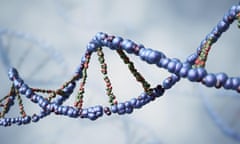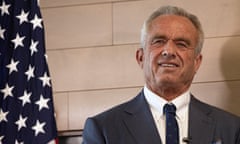Science Weekly
Twice a week, the Guardian brings you the latest science and environment news

How old are we really? What a test can tell us about our biological age – podcast
Science editor Ian Sample talks to Dr Brian H Chen, an epidemiologist at the California Pacific Medical Center Research Institute, who has conducted research into a variety of biological age tests called epigenetic clocks. He explains what exactly these tests are measuring and whether, once we have the results, there are any evidence-based strategies we can adopt to lower our biological age
Why did Spain and Portugal go dark? – podcast
Authorities are still trying to understand what triggered the massive power outage that left the majority of the Iberian Peninsula without electricity on Monday. To understand what might have been at play, and whether there’s any truth to claims that renewable energy sources were to blame, Ian Sample hears from Guardian energy correspondent Jillian Ambrose. And Guardian European community affairs correspondent Ashifa Kassam explains what it was like to experience the blackout and how people reacted

Why did Just Stop Oil just stop? – podcast
Just Stop Oil, the climate activism group behind motorway blockades, petrol station disruption and tomato soup attacks on major artworks, has disbanded after staging a final action in London this weekend. Madeleine Finlay hears from our environment correspondent Damien Gayle who has been covering Just Stop Oil since its inception. He explains how policy wins and policing crackdowns combined to bring the movement to a close, and what the future of climate activism could look like in its wake
Evidence of alien life, a clue about the rise of bowel cancer, and a new colour? – podcast
Madeleine Finlay and Ian Sample discuss three intriguing science stories from the week. From a hint at alien life on a distant planet to a clue in the search for answers over why colon cancer rates are rising in the under 50s, and news from scientists who claim to have found a colour no one has seen before
Is ‘de-extinction’ really possible? – podcast
The American biotech company Colossal Biosciences recently made headlines around the world with claims it had resurrected the dire wolf, an animal that went extinct at the end of the last ice age. Science correspondent Nicola Davis tells Madeleine Finlay about the process that created these wolves and why some experts have serious ethical questions about bringing back species whose habitats no longer exist

RFK Jr’s mixed messages on vaccines - podcast
As a measles outbreak expands across the US, comments by health secretary Robert F Kennedy Jr have come under scrutiny. Kennedy has said that the best way to prevent measles is to get vaccinated – but he has also caused alarm among paediatricians, vaccine experts and lawmakers by promoting vitamin A and nutrition as treatments for measles and questioning the safety testing of the MMR vaccine. He also recently announced a US-led scientific effort to establish the cause of what he terms the ‘autism epidemic’, with some experts concerned that this study will support the widely discredited association between autism and vaccines. US health reporter Jessica Glenza tells Ian Sample, the Guardian’s science editor, how these mixed messages are already impacting scientific research.
Streams of medicines: how Switzerland cleaned up its act – podcast
In the second of a two part series, Phoebe Weston travels to Switzerland to find out how the country has transformed its rivers, from sewage-filled health hazards to pristine swimming spots. She tells Madeleine Finlay how a public health disaster in the 1960s spurred the government to act, and what the UK could learn from the Swiss about taking care of a precious national asset.
Streams of medicines: what’s hiding in the UK’s waterways? – podcast
In episode one of a two-part series, biodiversity reporter Phoebe Weston tells Madeleine Finlay about the problem of chemical pollution in our waterways, and how it could be contributing to what the World Health Organization has described as ‘the silent pandemic’ – antimicrobial resistance.
‘Parasites should get more fame’: the nominees for world’s finest invertebrate – podcast
Invertebrates don’t get the attention lavished on cute pets or apex predators, but these unsung heroes are some of the most impressive and resilient creatures on the planet. So when the Guardian opened its poll to find the world’s finest invertebrate, readers got in touch in their droves. A dazzling array of nominations have flown in for insects, arachnids, snails, crustaceans, corals and many more obscure creatures. Patrick Barkham tells Madeleine Finlay why these tiny creatures deserve more recognition, and three readers, Sandy, Nina and Russell, make the case for their favourites
Where do our early childhood memories go? – podcast
It’s a mystery that has long puzzled researchers. Why can’t we remember our early childhood experiences? Freud called the phenomenon infantile amnesia, and for many years scientists have wondered whether it’s a result of failure to create memories or just a failure to retrieve them. Now new research appears to point to an answer. To find out more, Ian Sample talks to Nick Turk-Browne, a professor of psychology at Yale University.
What a dark energy discovery means for the fate of the universe – podcast
Dark energy, the mysterious force powering the expansion of the universe, appears to be weakening over time, according to a major cosmological survey that has thrown the laws of modern physics into doubt. Ian Sample tells Madeleine Finlay how this new finding could shed light on the ultimate fate of the cosmos, and Saul Perlmutter, who won a Nobel prize for his work proving the universe is expanding, describes how the new development could upend assumptions about how this mysterious force operates
A mysterious millionaire and the quest to live under the sea – podcast
Deep is a project backed by an anonymous millionaire to the tune of more than £100m that aims to establish a ‘permanent human presence’ under the sea from 2027. Guardian Seascape editor Lisa Bachelor visited the project on the Welsh border, and tells Madeleine Finlay what scientists hope to learn by spending extended periods living underwater
Use it or lose it: how to sharpen your brain as you age – podcast
Many of us believe that cognitive decline is an inevitable part of ageing, but a new study looking at how our skills change with age challenges that idea. Ian Sample talks to Ludger Wößmann, a professor of economics at the University of Munich, about the study
Mars-a-lago? Did the red planet once have sandy beaches? – podcast
The Mars we know now is arid and dusty but, as science correspondent Nicola Davis tells Madeleine Finlay, two new studies add weight to the idea that billions of years ago it was a much wetter place. Nicola explains why researchers think Mars was once home to sandy beaches and what this might tell us about its former habitability
Moon missions, Musk v scientists, sperm and longevity – podcast
Madeleine Finlay and Ian Sample discuss three intriguing science stories from the week. From two private moon landings to the controversy over Elon Musk’s continued membership of the Royal Society, and a new study making a link between men’s health and their sperm quality
Why it’s boom time for beavers in England - podcast
Beavers were once abundant in the UK, but hunting them for their fur, meat and scent oil drove them to extinction. Now they’re back, with the news that the release of beavers into English waterways is to be allowed for the first time in centuries. To understand why this is seen as a huge win for the environment, Madeleine Finlay hears from the Guardian’s environment reporter Helena Horton.
Drinks cans and chicken bones: will ‘technofossils’ be humanity’s lasting legacy? – podcast
When the palaeontologists of the future search for clues to understand how we lived, what might they find? Two scientists exploring this question have suggested that ‘technofossils’ will be our lasting imprint on the Earth. To find out exactly what these are and what they could reveal about our lives, Madeleine Finlay hears from the Guardian’s environment editor, Damian Carrington, and from Sarah Gabbott, a professor of palaeontology at the University of Leicester and one of the scientists behind the new book Discarded: How Technofossils Will Be Our Ultimate Legacy